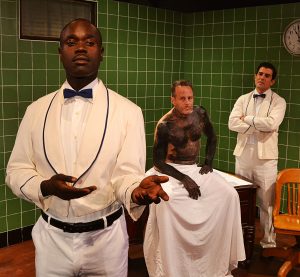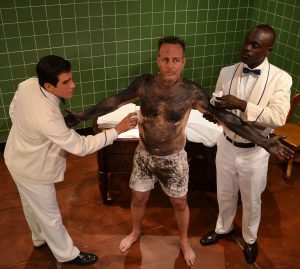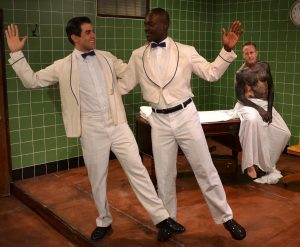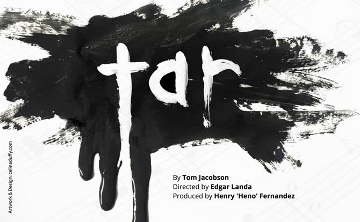TARANTINO IN THE STICKY SWAMPS OF SADNESS
Tom Jacobson’s Tar is from his The Ballad of Bimini Baths, a triad of works playing concurrently in Los Angeles. For half a century (1902-1951), the hot springs resort actually existed here in L.A., and Jacobson means to examine how far society has, or hasn’t, come by setting his three plays in different time periods at the Baths. This 60-minute one-act concerns two lowly workers of color who are assigned to wash the  tar off of a corpse. As usual with Jacobson’s work, nothing is what it seems as he takes people and places of historical significance and creates a metaphysical space of societal issues that begs for more cohesive storytelling.
tar off of a corpse. As usual with Jacobson’s work, nothing is what it seems as he takes people and places of historical significance and creates a metaphysical space of societal issues that begs for more cohesive storytelling.
Playwrights’ Arena immediately transports us to 1939, transforming Atwater Village Theatre’s intimate space into a green-tiled storage area with wooden floors (beautifully realized by set designer Justin Huen and costume designer Mylette Nora). Zenobio (Adrian Gonzalez), a Latino bathing attendant, tries to record on one of those newfangled Dictaphones the status of the body lying on the table beside him. A new attendant, Amen (Noel Arthur), who is Black, enters the room; within minutes, these two begin a name-calling game. This one-upping of racial slurs quickly chips away at the time period’s authenticity, forcing us to consider that this could be an alternate universe.
Turns out the white guy on the table, Donald (Tim Meinelschmidt), isn’t dead after all, but a drunk German, whose memory slowly comes back as he sobers up. As tar is wiped away by kerosene, the three try to unravel why he’s covered in tar. Soon, the dialogue has become un-mistakably Quentin Tarantino-like, and it’s painfully clear  that the character of Amen was purposefully designed to rant about racial issues with very odd and out-of-nowhere monologues masked as epiphany. The tone and mood is set to go somewhere and then it changes abruptly, leaving bemusement.
that the character of Amen was purposefully designed to rant about racial issues with very odd and out-of-nowhere monologues masked as epiphany. The tone and mood is set to go somewhere and then it changes abruptly, leaving bemusement.
The believability of 1939 continues to wane as Amen constantly and blatantly provokes Donald in this white-only bathhouse. Even if he had causation, suspecting Donald of murdering a black man, Amen would never have gotten away with it in that time period — even in liberal-heavy Los Angeles. As payback for the provocation from Amen, Jacobson makes Amen the butt of many clichéd penis jokes and even puts him on his knees to clean the tar off Donald’s penis. Zenobio acts and sometimes speaks in accordance with his position and the times, while Donald vacillates between the two.
Amen is sure that Donald is a killer, but Zenobio gives him the benefit of the doubt, trying to just be polite and not make waves in order to keep his job. However, Amen feels it’s his right to bring Donald to justice and even feels empowered enough to hold a lighter to him, knowing he is dowsed in kerosene. From here until the end, the play takes yet another very strange tonal turn, with an odd fight between Amen  and Zenobio that has obvious sexual positions woven in like a gay wrestling match. There’s more than a hint of homoeroticism between Amen and Zenobio that remains unexplored by play’s end, where everything is flipped on its head with murky motivation, but without a protagonist.
and Zenobio that has obvious sexual positions woven in like a gay wrestling match. There’s more than a hint of homoeroticism between Amen and Zenobio that remains unexplored by play’s end, where everything is flipped on its head with murky motivation, but without a protagonist.
Overall, it’s an interesting premise, but as with the La Brea Tar Pits, it’s mucky, sticky and inert – regardless of what lays buried beneath the surface. The acting was fine, but lacked gravitas to bring some authenticity back to the table. It’s almost as if director Edgar Landa wasn’t sure to do with this era-bending work, which can be called topical – as with most inclusion efforts lately – but it’s tough to get involved if we don’t know who these characters are.
photos courtesy of Playwrights’ Arena
Tar
Playwrights’ Arena
Atwater Village Theatre, 3269 Casitas Ave.
Sat at 8; Sun at 4; Mon at 8
ends on July 2, 2018 EXTENDED to July 9, 2018
for tickets, call 800.838.3006 or visit Playwrights
